NB In List | These 4 Gurudwaras where Indian Sikhs celebrate Baisakhi in Pakistan
14 Apr 2023 14:32:38
Baisakhi is an important festival for Sikhs, and it holds great religious significance for them. It is celebrated on Apr 13 or 14 every year and marks the Sikh New Year and the spring harvest festival. For Sikhs, Baisakhi is particularly significant because it commemorates the formation of the Khalsa, a community of initiated Sikhs who live by a strict code of conduct and uphold the values of equality, justice, and righteousness.
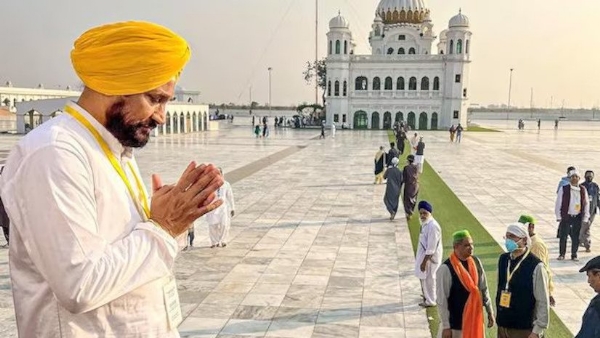
The Khalsa was founded by the tenth Sikh Guru, Guru Gobind Singh Ji, on Apr 13, 1699, in Anandpur Sahib, Punjab. On that day, Guru Gobind Singh Ji called upon his followers to gather in Anandpur Sahib and announced that he was going to initiate them into the Khalsa. He asked for five volunteers who were willing to offer their heads to him, and five brave Sikhs came forward, one by one. The Guru took each of them into a tent, and when they emerged, they were wearing blue turbans and had been initiated into the Khalsa.
Many Indian Sikhs travel to Pakistan on Baisakhi to visit several important historical Sikh sites located in Pakistan, including Nankana Sahib, Panja Sahib, and Dera Sahib. These sites are associated with the life and teachings of Guru Nanak Dev Ji, the founder of Sikhism, and are considered sacred by the Sikh community.
1. Gurudwara Kartarpur Sahib:
Gurudwara Kartarpur Sahib is a historical site located in Pakistan that holds great significance in the Sikh religion. It is believed to be the site where Guru Nanak Dev Ji, the founder of Sikhism, lived for the last 18 years of his life until his death in 1539.
Guru Nanak Dev Ji settled in Kartarpur in the later years of his life, where he established a community and preached his teachings of equality, compassion, and devotion to God. The site of his residence became known as the Kartarpur Sahib Gurudwara, and it remains a revered pilgrimage site for Sikhs around the world.
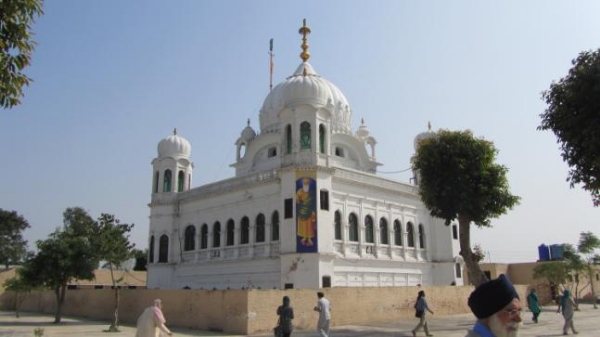
The Gurudwara is located on the banks of the Ravi River and was originally built by the Sikh ruler Maharaja Ranjit Singh in the 19th century. It was renovated and expanded in the 20th century, and it now includes a complex of buildings and facilities for visitors.
In November 2019, the Indian and Pakistani governments opened the Kartarpur Corridor, a visa-free border crossing between India and Pakistan that allows Sikh pilgrims to visit the Gurudwara without requiring a visa or a passport. The opening of the corridor was a significant development for the Sikh community and marked a rare instance of cooperation between India and Pakistan.
The Gurudwara Kartarpur Sahib is a testament to the rich history and cultural heritage of the Sikh religion, and it serves as a symbol of peace and unity between India and Pakistan. It continues to attract thousands of Sikh pilgrims every year, who come to pay their respects to Guru Nanak Dev Ji and to participate in religious ceremonies and cultural activities.
2. Gurudwara Dera Sahib:
Dera Sahib is a historical site located in Lahore, Pakistan, which holds great significance in the Sikh religion. It is believed that Guru Arjan Dev Ji, the fifth Guru of the Sikhs, spent the last years of his life here before being martyred in 1606.
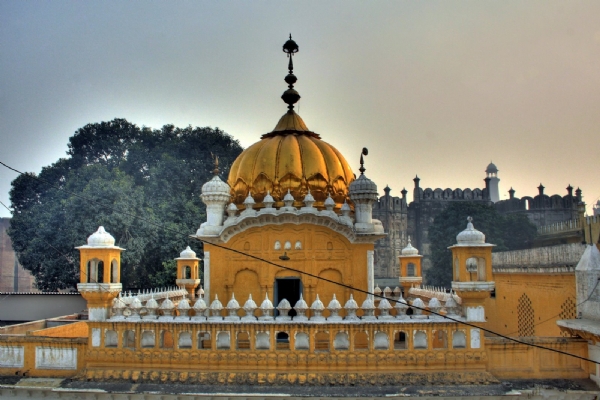
Guru Arjan Dev Ji was a highly revered spiritual leader of the Sikhs and the founder of the Golden Temple in Amritsar, India. He compiled the Sikh holy book, the Guru Granth Sahib, and is also known for promoting the concept of langar, a community kitchen where people of all castes and religions can come together and share a meal.
During his time at Dera Sahib, Guru Arjan Dev Ji faced persecution and torture at the hands of the Mughal Emperor Jahangir, who saw him as a threat to his rule. The Guru was eventually martyred in 1606, and his death is considered a defining moment in Sikh history.
Dera Sahib is also the site of the Shaheedi Jor Mela, a three-day festival held every year to commemorate the martyrdom of Guru Arjan Dev Ji. The festival attracts thousands of Sikhs from all over the world who come to pay their respects to the Guru and participate in religious ceremonies and cultural activities.
3. Gurudwara Panja Sahib:
Panja Sahib is a historical site located in Hasan Abdal, Pakistan, which holds great significance in the Sikh religion. It is believed that Guru Nanak Dev Ji, the founder of Sikhism, visited this site during his travels in the region.
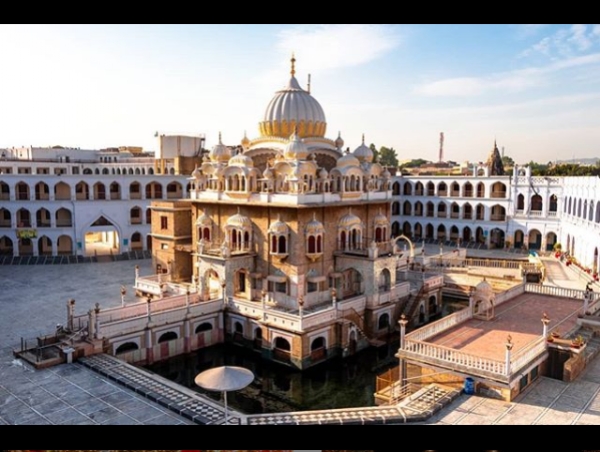
According to Sikh tradition, while Guru Nanak Dev Ji was resting at Panja Sahib, a local resident named Wali Qandhari, who was known for his ego and arrogance, became jealous of the Guru's popularity and decided to test his spiritual powers. Wali Qandhari challenged the Guru to move a large boulder with his bare hands, but the Guru declined and instead asked him to try moving the boulder himself. When Wali Qandhari failed to move the boulder, the Guru touched it with his hand, leaving a permanent imprint of his hand on the rock. The imprint, known as Panja Sahib, is considered a sacred symbol of the Guru's spiritual powers and is revered by Sikhs around the world.
In addition to its association with Guru Nanak Dev Ji, Panja Sahib is also believed to be the site where Guru Gobind Singh Ji, the tenth Guru of the Sikhs, visited during his travels in the region. He is said to have blessed the site and performed various miracles there.
Today, Panja Sahib is a popular pilgrimage site for Sikhs from around the world, who come to pay their respects to the Gurus and to see the sacred imprint on the boulder. The site also has a gurdwara, a Sikh temple, where visitors can participate in religious ceremonies and partake in langar, a community kitchen where people of all faiths and backgrounds can share a meal.
4. Gurudwara Nankana Sahib:
Nankana Sahib is a historical site located in Pakistan that holds great significance in the Sikh religion. It is believed to be the birthplace of Guru Nanak Dev Ji, the founder of Sikhism, who was born here in 1469.
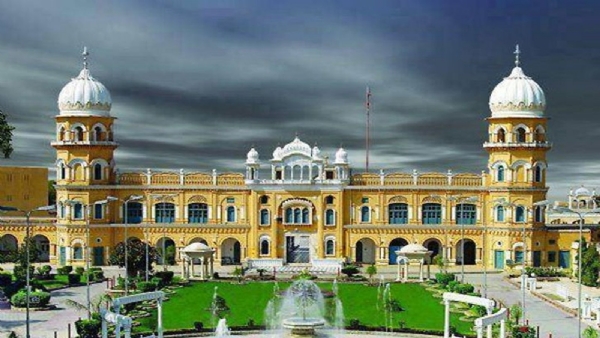
The site is home to the Gurdwara Janam Asthan, which is a Sikh temple that marks the birthplace of Guru Nanak Dev Ji. The Gurdwara was built in the 1920s and has undergone several renovations over the years. It is a popular pilgrimage site for Sikhs from around the world who come to pay their respects to the Guru and to participate in religious ceremonies.
Nankana Sahib has a rich history and was an important center of Sikhism even before the birth of Guru Nanak Dev Ji. The town was known as Rai-Bhoi-Di-Talwandi before it was renamed Nankana Sahib after the birth of the Guru. It was an important center of learning and spirituality for the Sikhs, and several Gurus and other prominent figures of the Sikh religion were associated with the town.
Despite political tensions between India and Pakistan, the Pakistan government has made efforts to preserve and protect Nankana Sahib and other Sikh historical sites in the country. The site is a testament to the rich history and cultural heritage of the Sikh religion and is revered by Sikhs around the world.
--